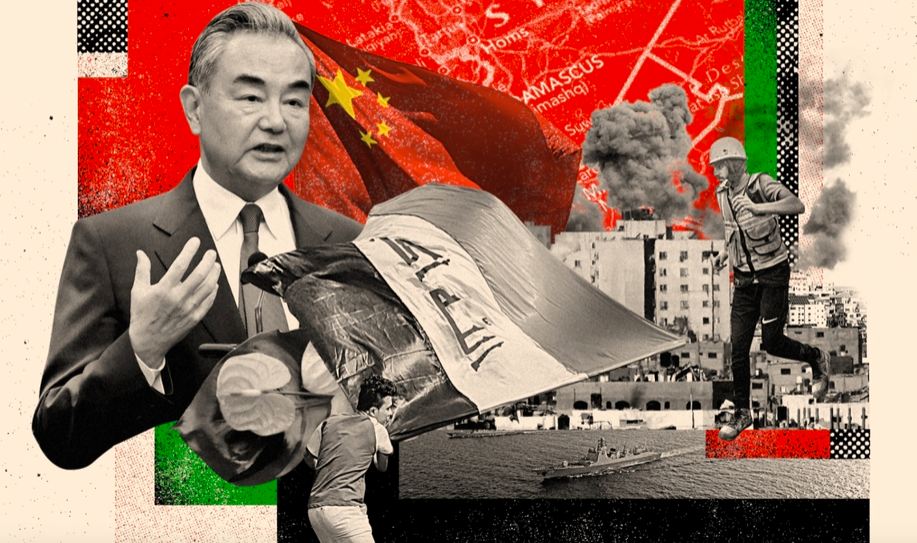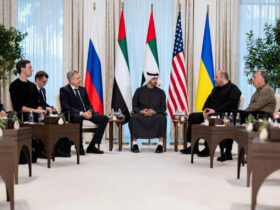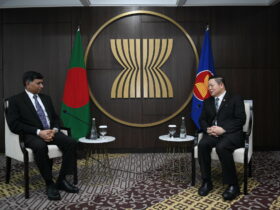By Shirley Ze Yu
If the conflict in Gaza were to spiral to a regional scale, almost certainly, the US would directly intervene, and possibly, China would, too.
However, the wars in Ukraine and Gaza also share one aspect in common. Both wars are reflective of global geopolitical competition, with the attempt to re-configure the “century of change.”
What has made China forego its long-standing position of political non-interference, including mobilising Chinese military presence in the Middle East? Why does China perceive the war in Ukraine differently from war in the Middle East?
The quest from China’s perspective is three-tiered. China’s objectives are motivated by its enduring core interest in the Gulf, newly formed regional partnerships, and global geo-economic and geopolitical imperatives.
The Gulf
Whether China is pro-Palestinian or pro-Israel, neither binary choice fully captures the reality. China has long supported Palestinian state-building while developing strong military and technology ties with Israel.
China’s strategic aim is to ensure peace and stability in the Middle East. A Middle East led by one regional hegemon will deem the region inherently unstable. Maintaining the subtle balance of power among multiple regional powers will give the region the highest likelihood of stability.
From this perspective, a Middle East multipolar security order that China strives to achieve is not fundamentally different from what the US had long endeavoured, until its 2003 invasion of Iraq, which destroyed the Middle East balance of power.
China’s core interest in the Middle East is neither Israel nor the Palestinian cause. China’s core interest in the region is undoubtedly the Gulf. This reflects and mirrors China’s domestic vulnerability and insecurity.
Whether China is pro-Palestinian or pro-Israel, neither binary choice fully captures the reality. China has long supported Palestinian state-building while developing strong military and technology ties with Israel. China’s strategic aim is to ensure peace and stability in the Middle East.
China is the world’s largest energy importer. Of China’s $365.5bn worth of imported crude oil in 2022, 53.6% originated from the Gulf. A quarter of Saudi Arabia’s oil exports go to China, accounting for over 16% of China’s total oil imports.
Compared to the significant two-way commodities and services trade with the Gulf, China’s economic engagement with Iran is much smaller and highly unequal. In 2022, China purchased 58% of the oil Iran exports, which accounts for only 6% of China’s total oil imports.
China’s securing the Middle East energy supply is crucial for building its military-industrial complex and engendering economic growth. China has a huge interest in ensuring that the Gulf region is stable and the sea lanes and straits over which oil is transported from the Gulf to China stay open.
No other major power in the world has a stronger stake — and strategic vulnerability— in the peace and stability of the Gulf than China today. A regional war that disrupts the oil supply can potentially bring China to an economic halt.
China has a huge interest in ensuring that the Gulf region is stable and the sea lanes and straits over which oil is transported from the Gulf to China stay open. A regional war that disrupts the oil supply can potentially bring China to an economic halt.
China’s newly emerging partners in the region
In Syrian President Bashar al-Assad’s state visit to Beijing in September, he managed to ink a milestone of the Syrian government’s global re-emergence, the China-Syria strategic partnership.
In the bilateral meeting between the two state leaders, China framed the newly minted strategic partnership in solidarity against the global geopolitical shifts.
Faced with Western sanctions, Syria will heavily rely on Chinese investments for the country’s post-war reconstruction. To date, China has already invested approximately $3bn in the country’s infrastructure.
Looking beyond the oil trade itself, China is more than willing to fill the economic vacuum in Syria, which borders a large oil producer and China’s major trade partner, Iraq, and a large Eurasian power and gateway to Southern Europe, Türkiye.
The infrastructure connectivity from Iraq to Türkiye through Syria would significantly transform the Eurasian economic landscape.
Just three months before, China and the Palestinian authority struck a similar strategic partnership. China saw a 23% rise in its exports to the West Bank in 2022 and the addition of the Chinese language to the school education system.
China continues to deliver aid, health care, and social support to the Palestinian territory, winning the hearts of the locals.
Two decades after the war in Iraq, China is today Iraq’s largest trading partner, and Iraq is China’s third largest trading partner in the Arab world. China has developed not only the country’s oil infrastructure but also water, electricity, and other public utilities.
In May, China surprisingly brokered the Saudi-Iran rapprochement, a manifestation of China’s economic and strategic sway in the Arab world.
Saudi state minister Musaed bin Muhammad Al-Aiban, Director of the Office of the Central Foreign Affairs Commission of the Chinese Communist Party (CPC) Wang Yi and Iranian Supreme National Security Council Secretary Ali Shamkhani.
China’s newly emerging partners in the region, Syria, Iraq, and the Palestinian Authority, along with its long-standing partner, Iran, are all not only on the periphery of Gaza but risk being the collateral casualty if the war were to escalate.
China’s newly emerging partners in the region, Syria, Iraq, and the Palestinian Authority, along with its long-standing partner, Iran, are all not only on the periphery of Gaza but risk being the collateral casualty if the war were to escalate.
With China’s increasing investments in large-scale infrastructure projects in the region, which are neither mobile nor liquid, China will come to a point when its large commercial stake makes it inevitable that China will do all it can to contain the war while brokering peace.
China’s global geopolitical imperatives
A third layer of China’s strategic intent is geopolitical. A level of chaos in the Middle East, contained within the East Mediterranean, can distract the US’s attention from the Pacific realm, expense the US’s military capacity, overwhelm the US economy with rising fiscal deficits and stubborn inflation, and invoke domestic dissent that consumes American unity.
Any move distracting the West from perceiving China as the primary global threat serves China’s interests. The war in the Middle East may also distract the US’s focus on Ukraine, offering Russia some needed respite.
If the US were to intervene in the military conflict directly, the move could be seen as politically alienating the Arab world and the domestic Arab population, further fracturing the fragile American civil cohesion and undermining the US’s global leadership.
Aircraft carrier USS Gerald R. Ford (CVN 78) in the Ionian Sea, part of the Mediterranean Sea, 04 October 2023.
As the 2024 US presidential election looms, any tendency to bring Trump’s isolationism back to the White House ultimately serves China’s interests.
Any move distracting the West from perceiving China as the primary global threat serves China’s interests. The war in the Middle East may also distract the US’s focus on Ukraine, offering Russia some needed respite.
Finally, the outbreak of conflicts in the Middle East and Europe ultimately attests to what Xi calls “the decline of the West.” The ongoing protests in Egypt, Jordan, and elsewhere in the Arab world see citizens angry not only at Israel but the US.
Any regional dissent that unravels a US-led global security order allows for the ushering in of a China-led global security alternative, widely endorsed by China’s partners in the Middle East and fittingly named China’s Global Security Initiative.
Peace in the Middle East is vital to China’s global development interests. The Middle East is central to China’s global infrastructure mapping, technology diffusion, and economic security. China’s economic livelihood relies on peace and security in the Middle East.
China’s enduring interest in the region is also geopolitical. The war-torn countries in the region are eager for partners. As the US shifts its global geopolitical focus from the Middle East to the Pacific, China is more than willing to step in to fill the economic and security vacuum the US leaves behind.
China’s development-for-security rather than a democracy-for-security proposition is also a unifier among governments of all political forms in the region. This implies that the global geopolitical competition centered on the US and China will continue to manifest itself in the region.
Previously published on al Majalla here. Cover graphic by al Majalla.

















Leave a Reply